Disclaimer: This article is not one sided. It looks at both sides of the issue and lays out the truth as presented by the facts of the matter. Those looking for confirmation bias one way or the other may want to look elsewhere.
Full disclosure, I’ve purchased keys from G2A before. Hell, over the last few months I’ve easily gotten 20 to 30 games from G2A, if not more.
To put this article into perspective, I didn’t look into G2A, Kinguin and grey market key sites in general to soothe some aching moral dilemma that keeps me up at night. You could show me proof positive that every game key I’ve ever gotten from grey markets was originally stolen and I wouldn’t care. (Although I know they weren’t.) I didn’t steal it and, unlike some people who speak out against grey market sites, I don’t have the luxury of turning down $15,000 in advertising deals and still being able to live comfortably with a $5,000 PC gaming rig.
I looked into these grey market stores because I got tired of hearing ignorant, regurgitated answers whenever the topic came up. “Oh, don’t buy from G2A. All their game keys come from third world countries and anyone who buys from them is hurting the industry at large.” If that’s true then how the hell are these sites still around, let alone thriving? How do they have a partnership with other big name corporate entities like Amazon and Google, or with developers like Hi-Rez Studios and Team 17?
It’s hard to ignore their prices are too good to be true, but there had to be more to the story than what naysayers would have me believe. So I took a hard look at the issue myself and here’s what I found.
 What’s a Grey Market?
What’s a Grey Market?
According to Webster, a grey market is “a market that legally circumvents authorized channels of distribution to sell goods at prices lower than those intended by the manufacturer.” The keyword here being “legally”.
All the people who think getting keys from G2A, Kinguin or any other grey market key resellers is illegal were proven wrong right out the gate with the first, and simplest, piece of information I unturned about grey markets in general. By definition, buying a game key from a grey market key reseller does not make you a criminal or an accessory to a crime.
Keep in mind we’re talking about legality, not morality. I’m simply defining black and white before we dive into the sea of grey. Hopefully this tidbit of obvious information opens the minds of people who have blindly accepted false information. I’ve run into quite a few people who think sites like G2A solely sell illicit goods when that’s clearly not the case.
Grey markets circumvent authorized channels of distribution by getting their products from secondhand sources. Garage sales, pawn shops and even Gamestop’s used goods are all examples of grey markets. Online examples include Ebay, Amazon and Craigslist. The goods don’t come directly come from the manufacturer, which means the distribution channel isn’t authorized, but they did come from the manufacturer at one point in time before being resold/traded.
Purchasing a product gives you full ownership of that product. It’s yours to use as you wish. This is an irrevocably understood truth that digital media has been struggling with for decades, and what grey markets exploit to offer their competitive prices.
The shadiness involved in grey markets comes from what happens between the item’s initial purchase to when it’s sold to a grey market. Everyone knows pawn shops are often used to off load stolen goods, and every year there are stories of people buying back stolen items from grey market retail locations. This is where grey markets tend to come under fire and get a bad reputation.
However, unknowingly buying stolen items isn’t a crime. In fact, by law, the thief who stole the items is required to pay you the purchase price of any stolen goods returned to their original owner due to an unlawful sale. Granted, especially in the case of online purchases, discovering and prosecuting the thief is difficult and purchasers of stolen items often wind up losing their money, but no criminal charges are pressed upon the buyer because no laws are broken. In the case of G2A and game key grey markets, your worst case scenario is potentially losing a handful of dollars.
Where do the keys come from?
This is the million dollar question that sites like G2A and Kinguin live and die by. The answer can get a little complex, so I’m going to break down the avenues and spell this out as much as I can.
- Developers
As G2a delicately explains on their site, game keys don’t magically appear out of thin air. Each individual key has to be made by the developer. Each time a key is made via Steamworks – which is the majority of the time due to Steam’s monopoly-like grip on the PC gaming industry – developers can cite the intended distribution point of the keys being made. G2A is so commonly used that it’s part of the distributor drop down list.
Yes, developers can and do choose to sell keys on sites like G2A themselves.
“Why would a developer sell their game for less than it’s worth?” (Its questions like this that tell me you don’t know the first thing about economics.)
Goods and services are only worth what people are willing to pay. It’s the most basic rule of economics that’s based on sheer common sense and yet for some reason people seem to get it in their head that there’s a genie who magically decides what something’s worth.
I’m going to let you in on a little secret. Most companies have no idea what they’re doing when they come up with pricing. Of course they take the cost of manufacturing and production into account to figure out what their lowest possible price requirement has to be in order to break even, but outside of that it’s a crap shoot.
The Elder Scrolls 4: Oblivion horse armor DLC is a prime example of this fact. Polygon released an article last year where Joel Burgess, the senior level designer at Bethesda Game Studios, admitted, “Back in 2005, developers were wondering, well, what does DLC even mean? How do we make it? How do we expect to know what people even want to play or what it’s going to cost? … We didn’t even know what we should charge.”
This is where market research and price testing comes into play, two things almost all companies do before they take a product to market in order to determine its most ideal/profitable price point. In the case of Oblivion’s horse armor, Bethesda didn’t have any markets to compare to and received a ton of backlash from the community because people felt their DLC wasn’t worth its $2.50 price tag. However, their blunder allowed Bethesda to test the market and they later came out with The Shivering Isles, which was widely praised for its value (costing only $15) and is still considered one the best pieces of game DLC ever made.
Grey markets like G2A are perfect proving grounds for market research and price testing. A company can release the game at $15 on steam, provide keys to a grey market for a little less and compare the rate at which their game sells. This gives the company more statistical data by which they can fine tune their prices later.
As an added boon, the company can price test like this anonymously, preventing people who bought the game at a higher price from feeling like they were cheated.
This is also a smart way for a company to maximize profits. Just because you feel like the game is worth $15 doesn’t mean that everyone else does too. A game key doesn’t require materials to create. Selling copies of a game after its made is sheer profit.
Let’s say 1000 people think a game that’s on Steam for $15 is really only worth $10. A developer can release 1000 keys on G2A for $10 and make the extra $10,000 in revenue while still profiting from everyone who’s willing to pay $15. And, again, they can do it anonymously to avoid bad press.
Is this the case for all the keys on Kinguin and G2A? No.
Is it the case for most of them? Probably not.
The point though is that developers have probable cause to provide keys to grey markets and do, in fact, do so.
- Cheap Region Keys
Let’s continue our lesson in economics and talk about one of the most controversial places grey market keys are known to come from.
Game prices differ depending on where you live. The regional equivalent of a game that costs $20 in the US won’t necessarily cost the same as said region’s monetary exchange rate. For example, as of the time of writing, Subnautica is on sale for $11.99. The European Union price is €11.99 ($13.27), in Saudi Arabia it’s SR 33.60 ($8.96) and in Russia it’s ₽ 251 ($3.53).
The supposed point of localizing game prices is to ensure gamers don’t get screwed over by fluctuating exchange rates, but that’s a little hard to swallow when the prices don’t add up from product to product. E.g. Tom Clancy’s The Division Season Pass costs $39.99, €39.99 ($44.24), SR 169.00 ($45.07) and ₽ 2399 ($33.77). Why does a Season Pass in Saudi Arabia cost more compared to its US price while the cost of Subnautica is less? Why are the percentages not stable?
Honestly, I don’t understand localized pricing, but the point is that it exists and that people game the system by buying a key using Russian rubles and then sell it in US dollars on grey markets to turn a profit all while offering the game for less than its Steam price.
(Sidenote: Localized prices are not charitable rates by companies who are trying to make gaming affordable in poorer companies. If anything, they’re pricing their game at what they think is the highest rate the most people in that region are willing to pay. Business is business. Steam and other major corporations don’t make decisions based on any other reason than the bottom line. Don’t be naive.)
In 2014 Steam started offering region coded keys in response to this phenomenon, making it to where US users couldn’t use Russian keys to activate a game. However, region coding comes with a lot of additional issues and not all developers use region coded keys.
When you see a new $60 game being sold on a site like G2A for $35 or $40, the key probably comes from another region. Grey market key sites do label their keys if they’re region coded to keep people from buying games that won’t work due to where they live, but it is possible for people in lower economic regions like Russia to get their hands on “Global” keys at a cheap rate and flip them on the grey market.
These games are being bought and resold legally. It’s gaming the system for sure, but the developer is making money on each key through a price point they have approved via Steam or wherever else the key was originally obtained from.
The rub is that people who would normally have to pay $60 are getting the game for $40 and some developers are crying over potential lost revenue. But you can’t prove that someone who bought something for $40 would’ve bought that same item for $60 if the cheaper option wasn’t available. Like I stated earlier, worth is determined by what someone is willing to pay.
I understand where the companies are coming from. If everyone decided to start buying their games from the cheapest region possible, there’d be a problem, but we’re talking about a small minority of gamers who are gaming the system – people who were so dead set against paying $60 that they took the time to find the game for $40.
In the end, the developer is getting paid, one person is getting the game (because keys are one use items and then they’re gone), and nothing illegal is transpiring.
- Past Sale/Bundle Keys
Let’s say Steam has a super amazing flash sale where for one hour they sell Dark Souls 3 for $5. Some enterprising souls (get it?) will buy hundreds of copies of the game and resell those copies for $10+ on grey markets when the sale is over, undercutting the game when it reverts back to its retail price of $59.99. Sites like G2A and Kinguin are full of keys that were obtained this way.
This is where a lot of the games I’ve gotten from G2A come from. I know without a shadow of a doubt my keys came from Humble Bundle by way of Humble Monthly. In my article “Humble Monthly Gets Better” I talked about how the influx of Humble Monthly keys in grey market sites plummet the prices and how I was able to get the games I wanted for one or two dollars. The situation has only progressively gotten worse (or better depending on your stance) since I wrote that article months ago.
Is this gaming the system? Yes, but the keys were still obtained legally and I’ve never had a single key revoked.
Brick-and-mortar businesses have been employing this method to turn profits for centuries. It’s literally economics 101 in action. Buy low, sell high. There is nothing shady or illegal about it. It’s one of the cornerstones of capitalism.
- Press and Promotional Keys
Last year Polygon published a lengthy article where they tracked down a Gravity Ghost key they purchased on G2A and found out it was originally sent to a YouTube press contact who was meant to promote the game. This was rather astonishing considering Erin Robinson, the developer of Gravity Ghost, actually hands out an extra key for each purchase of the game – many of which undoubtedly found their way onto the grey market too.
Yep, those YouTube and Twitch personalities you adore and empower aren’t always the upstanding centers of morality you think they are. Personally, I think selling the review code copy of a game is underhanded and unethical. But it’s not illegal.
This is where things start to get a bit sticky. A developer could make the case that these keys are illegitimate because they were never paid for in the first place, but they’re not exactly stolen goods either.
Should you not be able to resell a Christmas gift on Ebay? Sure it’s not the nicest or most ethical thing to do, but the gift legally belongs to you.
- Stolen/Illegitimately Purchased Keys
In 2015, hundreds of copies of Far Cry 4 were revoked because they were illegitimately purchased with stolen credit cards. Many of the keys were resold on G2A and Kinguin, which lead to a lot of ignorant articles and posts claiming “Ubisoft is banning CD Keys bought off websites like G2A.com” because “it seems like Ubisoft is mad that people prefer to buy games from them.”
It’s impossible/impractical for grey markets to check where each and every item comes from, which is partially why sites like G2A offer money-back guarantees/warranties on purchases. For a couple extra dollars you can get a G2A Shield on each purchase you make, which serves as a warranty in case your game is revoked. Should the worst happen, G2A will either provide you with another key or give you your money back.
What’s another $2 when you’re saving $10 or $20? In the case of the Far Cry 4 keys, G2A even went out of their way to confirm and refund purchases that didn’t include their warranty.
There are stolen keys sitting on G2A and Kinguin right now, but not nearly as many as naysayers would have you believe. The fact of the matter is that these companies are not the shady thieves guilds other people and companies have lead you to believe. They aren’t purposefully selling stolen keys, it’s just a hazard of doing business. That’s not an opinion, it’s supported fact backed by the system itself.
The Irony of Devolver Digital’s Tweet
Plenty of people against sites like G2A love to point out this 2014 tweet by Devolver Digital where the company said “Devolver Digital games purchased on @G2A_com are not legitimate, not guaranteed, and not supported. We are actively canceling those keys.”
The thing is, Devolver Digital never revoked any keys. In the Gravity Ghost G2A purchase article by Polygon, Nigel Lowrie, the co-founder of Devolver, said his company “has never revoked a key because of where it was sold.” And that article took place almost a full year after their tweet.
It Ultimately Comes Down to Charity
With everything we’ve discussed, whether or not you decide to purchase games from grey market sites ultimately comes down to a question of charity. Do you choose to pay the developer the most you can or take advantage of the cheaper price that someone else paid?
In my opinion, it doesn’t even come down to a question of morality because these companies are not maliciously selling stolen goods and they’re not massively inundated with stolen products like other people would have you believe. If your stance is to shun G2A and grey market key sellers because they facilitate fraud and the resale of stolen goods then I’m going to assume you’ve also never bought or sold anything with Ebay, Amazon or Gamestop because they’re all just as guilty of the same facilitation.
Frankly, some people can’t afford to buy every game under the sun at full price, and I don’t think it’s appropriate to condemn people who use grey market sites to make gaming a more affordable hobby. Grey markets aren’t hurting developers, indie or otherwise. They’re just taking advantage of basic market economics.
This is my current conclusion on the subject based on the facts I’ve discovered and laid out for you. I could change my mind if new information comes to light, but this is where I’m at on the subject after looking into it myself. I’m sure there are plenty of people who will vehemently disagree with me because this is the internet after all and I’m challenging predisposed ideas and opinions, but hopefully many of you will find this helpful in some way, shape or form.
Until next time, take it easy and keep on buying your games through whatever method you prefer.


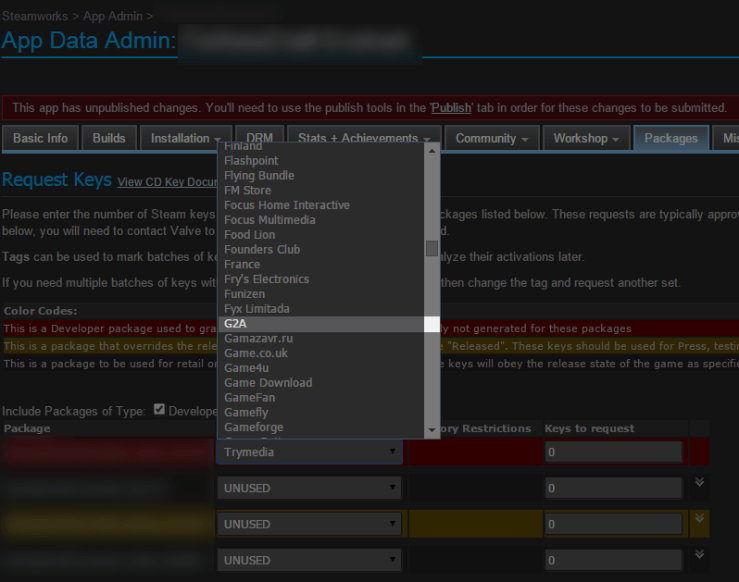
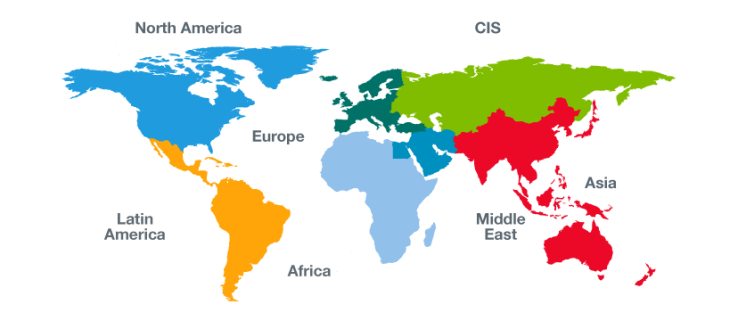

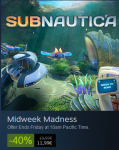

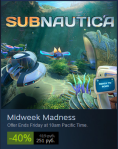

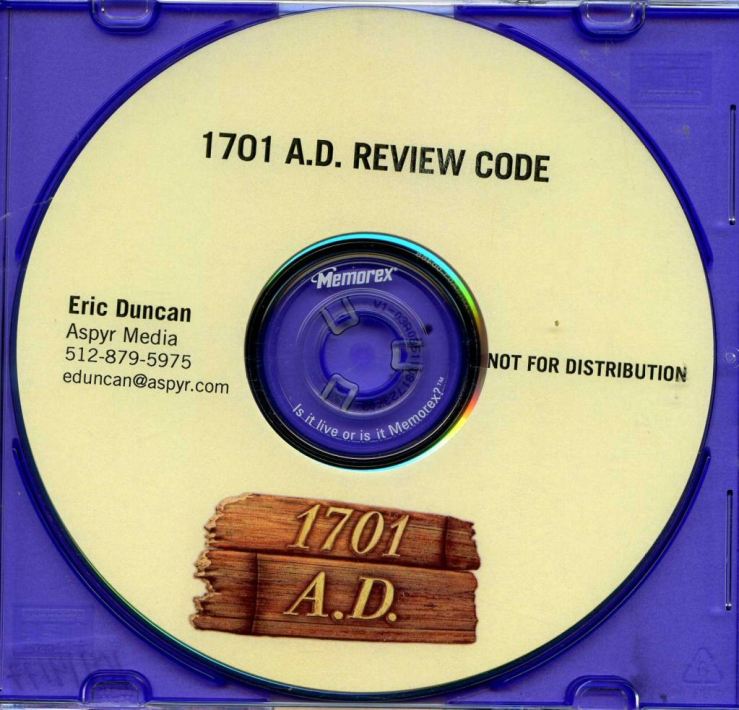

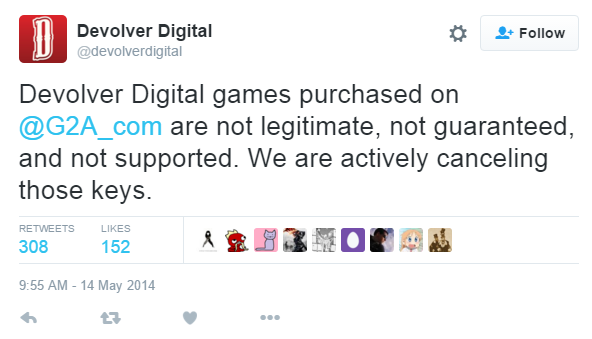
I will still be avoiding g2a due to their automatically including me in their monthly subscription thing that I had never agreed to (I think it was the sheild?). Those are the actions I find shady and certainly unethical. Even if I did agree to purchase the sheild for one game it was not clear to me that they’d be charging me monthly, even if it was only a couple dollars.
Aside from that I think sites like that are brilliant from a marketing and even an advertising standpoint. Makes a game accessible to more people who will recommend it to more people and so forth, and some of those people will buy it for full price.
LikeLiked by 1 person
At least you have a legit reason to avoid them and aren’t doing so because of some ignorantly held belief you heard secondhand that has left you atop a high horse.
LikeLiked by 1 person
Living in Germany the situation is a bit different. You write: “However, unknowingly buying stolen items isn’t a crime.”
I won’t make a judgement whether it’s unfortunate or unfortunate, but the fact remains that in Germany buying stolen goods in fact IS an illegal act in itself if the buyer might have had some “reasonable suspicion” that the goods were stolen. If, for example, the item in question was surprisingly cheap such a “reasonable suspicion” is assumed and you’re in trouble if you bought it anyway.
I only did a quick google search and it would appear that at least some other countries have similar regulations.
LikeLiked by 1 person
It’s illegal to knowingly purchase stolen goods, but, as a large portion of my article states, proving “reasonable suspicion” is a tall order. There are a number of perfectly legal and legitimate reasons to fully believe that the item was not stolen.
There’s also a matter that I didn’t bring up in my article, which is that “stolen” keys aren’t really “stolen”. All the cases in which developers had keys revoked were due to fraudulent purchases with stolen credit cards, which is a bit of a grey area as far as what does and doesn’t constitute “theft” to the letter of law. My main point is that proving actual conspiracy is harder than proving reasonable doubt.
Like I found, the vast majority of the ways these keys are obtained are 100% legal. In all actuality, maybe .5% of the keys available on G2A right now were fraudulently purchased, and even that’s being generous. Even if that number was 5%, that hardly constitutes “reasonable suspicion” or conspiracy to purchase stolen goods, but that also depends on how corrupt a country’s legal system may or may not be. (And I say that knowing full well the US legal system is pretty damn corrupt.)
I can only speak from experience as a US citizen, and I can say without a shadow of a doubt that anyone who thinks they’ll fall into legal trouble for purchasing keys on a grey market site is paranoid and show seek to better educate themselves on the legal system in general.
I appreciate you adding a more worldwide view to the discussion.
LikeLike
Had a bad experience a week ago with G2A. My Galak-Z key got revoked on Steam after a week of playing the game. The only thing I know is that the seller is from the U.S. (at least thats what appears to be, since he had the U.S. flag). When I activated the game the key worked. I really want to know how a key can get revoked from Steam after a while. Worst thing is, you can´t change the rating to negative after something like this. I rated the seller positive since the key worked atm, now I started a dispute (without G2A shiels which is equal to nothing). Obviously the seller has not replied the dispute and he knows his sin. Its funny cause before I bought the game the seller had 13 positive ratings. I asked G2A to improve their rating system If a dispute fails because of a Revoked key. Seems like they really dont care about this “black hole” on the rating system. Im not really mad cause I lost only 0.50 Euros for the game, but G2A still needs to improve a lot. It feels like they protect this kind of bad behavior.
LikeLike
I’m on the fence on the issue, and figured it couldn’t hurt to link to a recent article on the topic. It provides a reasonable and well-written counter-argument. Just trying to help contribute to the overall discussion. I see good points on both sides.
https://twinfinite.net/2016/06/dev-going-buy-g2a-please-pirate-game-instead/
LikeLike
Sorry. Here is the link to the full article. http://www.fortressofdoors.com/g2a-piracy-and-the-four-currencies/
LikeLike
Another reason why a developer might choose to sell their games 3rd party is the fact that they get ~100% of the profits! Usually they owe a percentage of the sales to Steam and their publisher and their game engine (I think unreal engine and unity want a percentage of your game if it sells well), etc
LikeLike
Forgot to mention the reselling of keys acquired by posing as a reviewer.
LikeLike
No I didn’t, it just isn’t a primary point of concern. It’s more of a separate issue. One that doesn’t really reflect on grey markets at all.
LikeLike
Great article with valid points. In the end its always the choice of the buyer/gamer/consumer wether or not to buy somewhere.
The main problem I see, is that a lot of people have no idea about where they are buying. Let alone know the difference between “grey” and official resellers or potential risk. One of those risks being losing hours of gameplay or even get your account locked and losing all in the account. ( basically the 2 options if something was fishy with the key you purchased )
Equipped with the knowledge you get the real option to make a choice. A choice not only on price, but the choice in:
– taking a risk( no matter if its a small or big risk ) or going for the safe bet.
– being unsure where the key is obtained via any specific way ( sales, bundles or less pretty circumstances ) or being 100% certain where the product is bought by the retailer
Give consumers the information to help them make choices, knowing the different sides of the fence. Then any choice is good wether they buy from a “grey” etailer or an authorised etailer.
LikeLike
Very well written and insightful article. I might add that the eternally parroted ‘devs/publishers set the prices on Steam’ isn’t exactly true as they get ‘advice’ from Valve on how much they should charge for their game.
The introduction of regional pricing was a move to curb piracy by making buying games more attractive.
Kinguin and G2A will of course suggest their ‘buyer protection’. It in fact does nothing. Emailing them proof that the
key in question was a duplicate was always sufficient for a refund in the rare cases I encountered on both of these sites.
LikeLiked by 1 person
What’s your opinion about hpHosts blacklisting G2A? If you download their HOSTS file then access to G2A will be null-routed; my understanding is that it is due to their parent company Malwarebytes having trouble with stolen keys sold there.
When I asked the admin of hpHosts, he said it was with their legal department and he was unable to discuss much more than pointing out Malwarebytes forum threads where suspicious MB keys were reported.
LikeLike
I’ve never heard of hpHosts and after looking into it I’m not sure why someone would use it. It looks like a service for people who aren’t very tech savvy. Basic file knowledge and antivirus makes the service useless and is most likely going to make people overly protected to the point where they start getting in their own way.
That aside, if they blacklisted G2A it’s because they’re just watching their own ass. All it would take is one case of someone using hpHosts to access G2A, getting the key they bought revoked, and then complaining to hpHosts. The people running hpHosts clearly don’t vet their blacklist very thoroughly because it’s clear that G2A.com isn’t a “malicious website”. But it’s also popular to poo on G2A, so blacklisting the site would likely make a lot of their users happy and feel vindicated.
In short, they most likely blacklisted G2A due to ignorant peer pressure.
Services like hpHosts will always err on the side of blacklisting than not. The more sites they can claim to be “protecting” their users from, the better they look.
LikeLike
They also blacklist most pirated.software sites.under the WRZ category (illegal downloads but not Mal ware, medium risk), though they flagged TPB as EMD (malware).
If you are offended with the listing of FSA for the .com or WRZ for the .co, take it up with the site owner.
As previously mentioned, Malwarebytes’ legal department has had issues with keys for their products that have been sold through the G2A platform.
Crazy enough I actually bot DOOM (2016) and all DLC straight from Steam for less than the going price on G2A thanks to the Thanksgiving sale.
LikeLike
The seasonal Steam sales are almost always the best time to buy. It’s also a time when many grey market sellers buy up a bunch of keys to resell for a profit when the sales end.
LikeLike
Good one I like it, I also bookmark it so I can check other posts of yours!
LikeLike
So you don’t have a Problem turning a blind eye to the issue because the criminal pays your gaming rig? That’s a pretty sad excuse.
Part of the problem is that G2A rather willingly accepts the profits of stolen goods and up to now barely did anything to prevent it.
LikeLike
Your question makes zero sense and makes it seem like you didn’t read the article at all.
In every situation G2A has gone out of their way to work with developers and offered full refunds to anyone who purchased a fraudulent key and had it revoked by Steam regardless of whether they bought the Shield or not.
If you have a problem with Grey Markets, that’s fine, but you should also have a problem with Ebay, Amazon, Gamestop, Best Buy and just about every major store because they all practice in grey market sales (Gamestop built their business on it) and they all sell stolen/fraudulently purchased merchandise on a daily basis.
LikeLike
You had some good points but you started talking down to your readers and it turned me off enough to stop reading, thanks for your time and have a nice day. c:
LikeLiked by 1 person
Every now and then I get the odd comment on this or my old YouTube videos. I don’t take them down due a desire to “let the record stand” so-to-speak (and honestly a bit of laziness). Most of those comments are hate-fueled vitriol, so I simply delete the notification email and go back to what I’m doing.
But I’m logging into this blog for the first time in nearly a year because you make a good point. Honestly, as I wrote the article I became defensive. I knew the amount of hate my opinions would draw as I wrote them and I think that played a significant part in the tone. I started speaking to those who would push back against my ideas instead of simply presenting them.
That being said, I don’t think the tone goes full-on condescending. I think the defensiveness is clearly there and I can see how it could be off-putting to some people, but I disagree that it’s heavy enough to warrant completely disregarding. It’s not like I go full-on Jim Sterling and spend a paragraph ridiculing the other side of the opinion. I stay on topic throughout the piece.
Clearly you thought otherwise though and I’m sorry if I came across heavily condescending. I can assure you it wasn’t my intention and that it came from a place of defensiveness, not actual disdain for the audience.
I wrote this a long time ago now and a lot has changed. My main opinion on grey markets and key re-sellers in general hasn’t, but I do think G2A has done some things since this article that certainly justify people’s disdain for the company more. Although I do still believe a lot of the hate directed towards the company is still bandwagon-fueled and born from a misunderstanding of how the system works.
I’m not a games writer anymore though – aspiring or otherwise. I’m actually working as a game developer now, choosing to try being the change I want to see in the industry instead of just bitching about it. Not that there’s anything wrong with the latter, I just thought there were already plenty of people better and more established than I working in the medium – fighting the good fight so-to-speak. I definitely prefer being on the development side of things.
Thanks for the constructive criticism though. It’s a breath of fresh air compared to the usual responses. More writers need responses like yours, whether they’re positive or negative. From the other side of the pen, it’s encouraging and helpful even if it’s pointing out a few flaws.
LikeLiked by 1 person